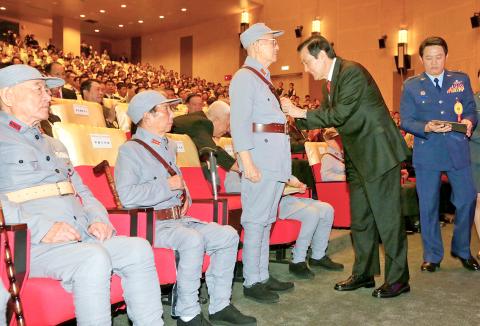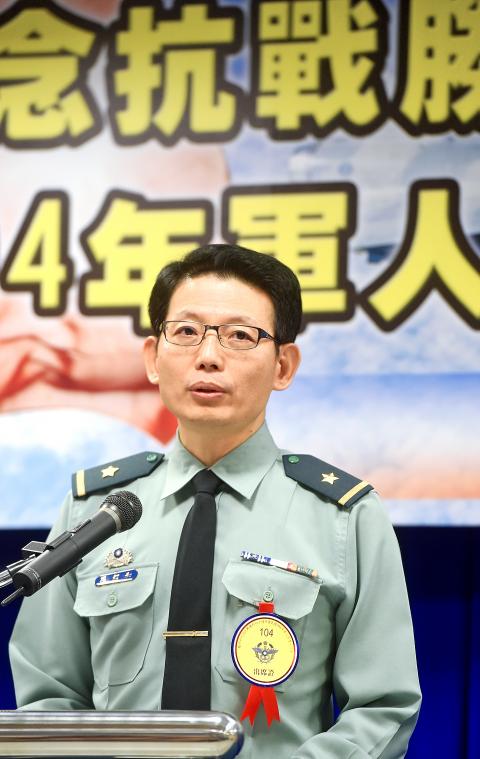President Ma Ying-jeou (馬英九) yesterday expressed regret over a claim by Beijing that Chinese Communist Party (CCP) forces played a significant role in the victory in the Second Sino-Japanese War, while a former high-ranking Chinese Nationalist Party (KMT) official put it more bluntly, accusing former vice president Lien Chan (連戰) of being “disgraceful and belittling himself” over his insistence on attending a military parade to commemorate the end of the war in China today.
During a meeting with Chinese President Xi Jinping (習近平) in Beijing on Tuesday, Lien said: “The [then-]Chinese Nationalist Party forces led by Chiang Kai-shek (蔣介石) fought a series of decisive and major battles on the front lines and dealt the Japanese military a heavy blow, and the Chinese Communist Party forces led by Mao Zedong (毛澤東) effectively pinned down and crushed the Japanese and the collaborationist armies on the battlefield behind enemy lines.”
Xi, who is also the general secretary of the CCP, said that the KMT and the CCP “cooperated and coordinated” actions during the campaign against Japan and that “both made significant contributions to the victory.”

Photo: CNA
Speaking in Taipei at a ceremony to commemorate the 70th anniversary of the end the Second Sino-Japanese War, Ma said that it was Chiang who led the Republic of China (ROC) to victory in the eight-year war against Japan.
“We feel regret” that the CCP has been claiming that it led China in the war against Japan and has been ignoring the fact that the Chinese Nationalist Party government directed the war and the ROC military made the greatest contribution, Ma said.
“We have never denied that Communist forces participated in the war against Japan, but the Communist forces did not maintain leadership and instead played a supplementary role, which is the historical truth,” Ma said.

Photo: Chien Jung-fong, Taipei Times
The Ministry of National Defense also took issue with Lien’s remarks, saying that the ministry “cannot accept or agree with” the comments made by Lien in China.
His comments have “deviated from historical facts,” it said.
“Whether on the front lines or behind enemy lines, the ROC government led the campaign,” ministry spokesman Major General David Lo (羅紹和) said.
With regard to today’s parade in Beijing, ROC retired generals should firmly support the government and not travel to China to attend such activities, Lo said.
He urged them to “safeguard national and historical dignity and avoid causing misunderstandings among the public and trouble for the government.”
Beijing has invited Lien and ROC retired generals to attend a series of events for the anniversary.
Lien’s visit has not been endorsed by the government.
Former National Development Council minister Kuan Chung-ming (管中閔) reacted to Lien’s visit with fury.
Kuan questioned the veracity of Lien’s comments with regard to the Second Sino-Japanese War, posting scathing remarks on Facebook..
“A direct assault was only good enough to ‘deal a heavy blow,’ but attacking from behind the enemies’ back was enough to crush them?” Kuan wrote.
He added that Lien should have referred to Chiang as “Chairman Chiang,” even if it meant he would have to refer to Mao as “Chairman Mao.”
“However, Lien, as a former KMT chairman, disrespectfully omitted Chiang’s official title,” Kuan said.
“All in all, [Lien is] base, disgraceful and self-belittling,” Kuan said, adding: “And you [Lien] want to spectate at [China’s] military parade? Spectate my ass!”

CHIPMAKING INVESTMENT: J.W. Kuo told legislators that Department of Investment Review approval would be needed were Washington to seek a TSMC board seat Minister of Economic Affairs J.W. Kuo (郭智輝) yesterday said he received information about a possible US government investment in Taiwan Semiconductor Manufacturing Co (TSMC, 台積電) and an assessment of the possible effect on the firm requires further discussion. If the US were to invest in TSMC, the plan would need to be reviewed by the Department of Investment Review, Kuo told reporters ahead of a hearing of the legislature’s Economics Committee. Kuo’s remarks came after US Secretary of Commerce Howard Lutnick on Tuesday said that the US government is looking into the federal government taking equity stakes in computer chip manufacturers that

POWER PLANT POLL: The TPP said the number of ‘yes’ votes showed that the energy policy should be corrected, and the KMT said the result was a win for the people’s voice The government does not rule out advanced nuclear energy generation if it meets the government’s three prerequisites, President William Lai (賴清德) said last night after the number of votes in favor of restarting a nuclear power plant outnumbered the “no” votes in a referendum yesterday. The referendum failed to pass, despite getting more “yes” votes, as the Referendum Act (公民投票法) states that the vote would only pass if the votes in favor account for more than one-fourth of the total number of eligible voters and outnumber the opposing votes. Yesterday’s referendum question was: “Do you agree that the Ma-anshan Nuclear Power Plant

Chinese Nationalist Party (KMT) lawmakers have declared they survived recall votes to remove them from office today, although official results are still pending as the vote counting continues. Although final tallies from the Central Election Commission (CEC) are still pending, preliminary results indicate that the recall campaigns against all seven KMT lawmakers have fallen short. As of 6:10 pm, Taichung Legislators Yen Kuan-heng (顏寬恒) and Yang Chiung-ying (楊瓊瓔), Hsinchu County Legislator Lin Szu-ming (林思銘), Nantou County Legislator Ma Wen-chun (馬文君) and New Taipei City Legislator Lo Ming-tsai (羅明才) had all announced they

Nvidia Corp CEO Jensen Huang (黃仁勳) yesterday visited Taiwan Semiconductor Manufacturing Co (TSMC, 台積電), as the chipmaker prepares for volume production of Nvidia’s next-generation artificial intelligence (AI) chips. It was Huang’s third trip to Taiwan this year, indicating that Nvidia’s supply chain is deeply connected to Taiwan. Its partners also include packager Siliconware Precision Industries Co (矽品精密) and server makers Hon Hai Precision Industry Co (鴻海精密) and Quanta Computer Inc (廣達). “My main purpose is to visit TSMC,” Huang said yesterday. “As you know, we have next-generation architecture called Rubin. Rubin is very advanced. We have now taped out six brand new